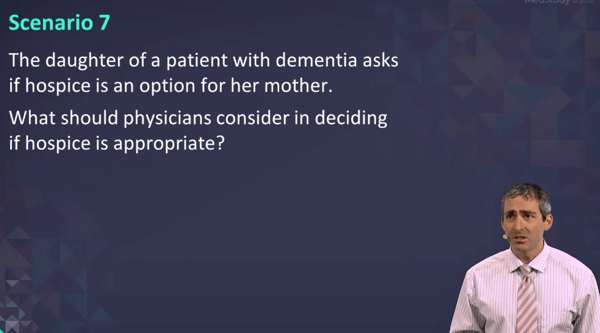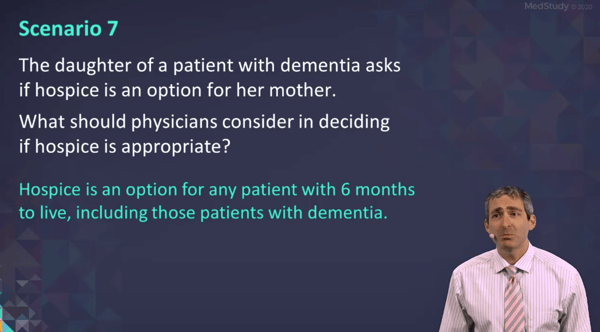Scenarios in Ethics and Palliative Care: When Is Hospice Appropriate?
.png)
Did you know that October 10th is World Hospice and Palliative Care Day? This month is the perfect time to brush up on palliative care topics with Hospital Medicine Basics.
When you flip through the Hospital Medicine Basics syllabus and watch the videos, you will come across a section called Scenarios in Ethics and Palliative Care. In this section, Dr. Gil Porat takes scenarios from the Ethics Section of Internal Medicine Core and drives home some key points in ethics in medicine. The situations discussed in Hospital Medicine Basics are practical scenarios, you will most likely see similar situations if you work as a hospitalist.
In scenario 7, you'll see a case where the daughter of a patient is asking if hospice is appropriate for her mother.
The situations that are presented usually have an accepted standard of care. So they make good test questions! And, since you want to make sure you are making decisions along the accepted standards of care, they make for great material for maintaining your competency.
Is Hospice Appropriate?
The seventh scenario in Hospital Medicine Basics is concerning the daughter of a patient with dementia, she asks if hospice is an option for her mother.
What should physicians consider in deciding if hospice is appropriate?
 Dr. Gil Porat discusses practical scenarios regarding ethics in Hospital Medicine Basics videos
Dr. Gil Porat discusses practical scenarios regarding ethics in Hospital Medicine Basics videos
Take a second to think about this before you read the accepted standard of care.
Standard of Care Regarding Scenario 7
 Dr. Gil Porat discusses practical scenarios regarding ethics in Hospital Medicine Basics videos
Dr. Gil Porat discusses practical scenarios regarding ethics in Hospital Medicine Basics videos
Some hospice scenarios are pretty clear cut decisions, for example, a patient who is sure that they want to stop hemodialysis and is consistent about it. Another example would be a late stage cancer patient, where they are no longer eating or able to get out of bed and who is not a therapy candidate for chemotherapy or radiation therapy.
Hospice care is a subset of palliative care, where the focus of the care is solely on comfort. It's a Medicare benefit and nearly all commercial insurances also have a hospice benefit. It is available to any patient with a prognosis of 6 months or less who wish to forgo curative or life prolonging therapy, this includes those patients with dementia.
Remember that the 6 months or less is based on your best judgement, as no one can predict end of life timing perfectly.
Where Hospice Care Happens
In his lecture, Dr. Porat shares a story of a time he was in Portland, Oregon, he had a patient who wanted to live out of his car. For a while he did hospice care out of his car. The nurses would actually show up to where he was parked. His point was that hospice really is a situation, not a place.
Patients who receive hospice care forgo hospitalization for their terminal illness, however, they continue to receive treatment for diseases unrelated to their terminal diagnosis. For example, if a patient sustains a hip fracture and want it repaired, even if they are on hospice for something like advanced heart failure, they can still get that hip fracture repaired.
When Should You Certify Patients For Hospice Care?
Physicians certify patients for hospice care when they have an estimated life expectancy of less than 6 months. In general, a declining functional status is a poor prognostic sign.
There are some disease-specific considerations in qualifying for hospice care. Dementia is a particularly tricky one, but is also a pretty common scenario since the disease is so often seen.
Patients with dementia qualify for hospice when they are dependent on others for nearly all their activities for daily living, their ADLs, for example: if they are incontinent of bowel, or bladder; have limited meaningful communication; have a complication that arises from their advanced dementia. These complications can include a recent history of aspiration pneumonia, pyelonephritis, bacteremia, stage 3 or stage 4 ulcers, or 10% weight loss in the past 6 months.
What To Do If You're Conflicted About Recommending Patients for Hospice Care
If you are conflicted as to whether or not someone qualifies for hospice care, you can get an opinion from a palliative care provider. You can often look up disease-specific considerations, too.
In general, a declining functional status is a poor prognostic sign in most diseases. You can use the Karnofsky Performance Status Scale or other performance scales in helping to decide where a patient is at.
Remember to document their performance scale number in the chart. That not only justifies your thinking, but it also gives you and other providers a point of comparison, and therefore objectively trends on a scale when a patient is seen at a later date.
Watch Other Scenarios in Ethics and Palliative Care
If you haven't already, you'll want to read the first two scenarios: Can a Suicide Attempt be a DNR? and Can You Share Medical Info Against a Patient's Wishes With Their Spouse?
In Hospital Medicine Basics, Dr. Porat covers 7 scenarios in total and gives the standard of care for each.
When you purchase Hospital Medicine Basics, you'll receive 5 videos with 2 expert speakers who go over clinical quality measurements, consultative co-management and hospital-based prevention strategies, and scenarios in ethics and palliative care. You'll also receive a comprehensive, 40+ page printed syllabus that goes over all the slides, pictures, and questions mentioned in the video lectures.


.png?width=600&name=HMB%20Blog%20image%20(1).png)
